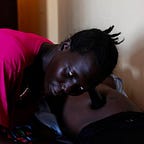Emergency caesarean sections saving lives in land-locked Ganyiel
Rebecca, 30, was carried on a stretcher as her relatives walked for five hours to seek help in the remote town of Ganyiel in southern Unity, South Sudan.
Bleeding heavily from a fresh stillbirth and her life in great danger, Rebecca was one of the lucky ones; she reached the health facility just in time. An emergency caesarean saved her life.
“I came to the health facility and got help and I survived”
“It was not my expected due date. It was very early and it happened suddenly,” Rebecca said. “I was at home when I started bleeding heavily until I felt that the baby was no longer alive inside me. I came to the health facility and got help and I survived.”
In December 2015, with funding from the Health Pooled Fund (HPF), Ganyiel reproductive health centre opened the first operating theatre in the history of Panyijiar county.
Before it opened, when there was a medical emergency the people of greater Ganyiel might walk 12 hours to reach Nyal where there were several health facilities but no operating theatre. Or they might travel by canoe for two days to reach Leer, though the hospital there which carried out operations for the whole of southern Unity was destroyed by fighting back in 2013.
Two days, or even 12 hours, is a long time in an emergency situation and would often mean the patient would die on the way.
In the first seven weeks after it opened, the operating theatre in Ganyiel carried out 33 operations, all successful, including five emergency caesareans and five major surgeries.
Rebecca’s was the first caesarean section. Esther’s was the second.
Esther, 36, also lives five hours away from Ganyiel by foot but when she experienced complications early in her pregnancy she moved to stay with a relative nearby the CEmONC centre to be close to help if she needed it.
“When my labour started it did not progress normally. It was an obstructed labour for three days. After the third day, I was still at my relative’s home and I was exhausted,” Esther said.
Her relatives took her to the health facility where she was examined. The baby was found to be suffering severe foetal distress. With Esther and her relative’s consent, the doctor performed an emergency caesarean section.
Esther’s baby, Nyawal, survived and is now a healthy one-month old. Esther’s abdominal scar is almost healed.
Esther has eight children at home but another four of her children were still born. This was her first time to deliver at a health facility.
“If there is a problem at home who is going to support me? It is better to come here where you can get help”
“Delivery at home now has become a problem for me. And if there is a problem at home who is going to support me? It is better to come here where you can get help,” she said.
“I would advise all pregnant women to go to the facility for a check-up early so the doctor can advise you if there is an abnormality.”
Eighteen-year-old Nyaboth had an emergency caesarean just a few days ago and is still at the health facility recovering.
This was her first pregnancy and she said she experienced no problems until she went into labour.
“When labour started I was at home with my mother, father and husband. It was night and then day and then night again but there was no progress. The baby did not come because it was buttocks first,” she said.
Living far from the health facility Nyaboth’s family knew there was little hope that she would survive the long walk to Ganyiel.
Luckily, HPF implementing partner IRC was conducting a nutrition assessment nearby in the village. Hearing this, Nyaboth’s father asked them to take her by car to Ganyiel.
By the time Nyaboth reached the facility her uterus had partially ruptured from the prolonged labour and she was bleeding very heavily. Nyaboth was so exhausted she couldn’t speak. They had delayed at home until it was almost too late.
The doctor was able to operate and save Nyaboth’s life, but her baby had died about four hours earlier.
“I am very happy for HPF. Without this I would be dead. Thank you for opening this operating theatre”
“I am very happy for HPF. Without this I would be dead. Thank you for opening this operating theatre and for providing us with a doctor for these services to save lives,” Nyaboth said.
“I am still very worried about my next pregnancy and labour but I will go to the health facility to get the services to avoid what happened to me this time.”
HPF is funded by the governments of the United Kingdom, Australia, Canada, Sweden and the European Union.
